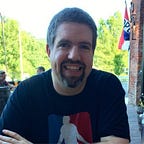It Took Gary Numan 30 Minutes To Write “Cars”
When Gary Numan first discovered electronic music at the end of 1978 it wasn’t by design. Then a member of the punk band Tubeway Army, Numan was on his way to the studio to record their Tubeway Army debut when he discovered an instrument that would forever change his career. “There was a Minimoog synthesizer in the corner of the control room waiting to be collected by a hire company, which, lucky for me, never turned up, and I was able to use it for two or three days,” Numan said in Jonathan Bernstein and Lori Majewski’s book Mad World: An Oral History of New Wave Artists and Songs That Defined the 1980s. “I’d never seen one before and I loved it”
As luck would have it, the synth’s previous user had adjusted the settings to create a perfect, bottom-end heavy sound that piqued his interest. Without these ideal settings Numan isn’t sure he would’ve done much with the instrument. “I wouldn’t have known how to get that sound; I didn’t know anything about synthesizers,” he said in Mad World. “They were just a bunch of dials to me.”
Fixated with his new toy, Numan spent the next few days messing around with the machine and was soon obsessed with the distinct qualities of the Minimoog. It wasn’t long before it became a central part of his recording process. “I developed a massive passion for electronic musically practically overnight,” Numan said in Mad World. “I very hastily converted my pure punk songs into electronic songs.”
When he showed up at the label offices of Beggars Banquet with Tubeway Army, which he described as a “pseudo-electronic punk album”, one of the label’s directors was so pissed off by the unorthodox sound that he tried to fight Numan during the albums unveiling.
“I didn’t know anything about synthesizers. They were just a bunch of dials to me.”
The angry folks at Numan’s label were soon forced to eat humble pie as Tubeway Army charted in the UK and exceeded everyone’s commercial expectations. Putting aside their initial reservations, Beggars Banquet asked the band to start working on a sophomore effort.
If the modest success of the band’s first album had been a pleasant surprise, the reception of Replicas was a complete shock to both Tubeway Army and their label. Both Replicas and the single “Are ‘Friends’ Electric?” both reached #1 on the UK charts in 1979.
Just as Tubeway Army reached peak commercial success, Numan wanted out of the band so he could embark on a solo career and give himself full creative control of his music. While working on his solo material he developed an interest in learning bass and purchased an inexpensive Shergold Modulator bass guitar. The first thing he played on the Modulator were the opening four notes of “Cars”. The catchy bass riff set the stage for an explosive creative outburst from Numan. “Honest to God, “Cars” took me 10 minutes — all the parts, all the arrangements. Another 20, and the lyrics were done,” he said in Mad World. “It was the most productive 30 minutes of my life.”
Numan’s half-hour creation became a #1 record in the UK and a charting hit in the US. Released in August of 1979, “Cars” gave Numan his second #1 song in the same year. This may sound like the stuff of dreams for an aspiring musician, but Numan found his voyage from total obscurity to selling close to 50,000 singles a day in the United Kingdom overwhelming. Interview requests were constant and technology magazines who saw him as some kind of synth wizard wanted his insight — never realizing that Numan himself still didn’t have a great understanding of synthesizers. “They were asking me about envelopes and fills and boffin shit. I just blagged and bullshitted my way through it,” he said in Mad World.
“If there is anything that I can do that sets me apart, it’s putting noises together.”
Beyond their initial sales and success, both “Cars” and the Pleasure Principle had wide-reaching influence on various artists and genres of music. “Cars” is considered by many to be one of the seminal new wave/synth pop records of the late-70s and 80s. The sounds of Pleasure Principle also influenced Chicago house, early Detroit techno, and inspired artists like Lady Gaga (see “Paparazzi”) and Nine Inch Nails.
Despite respect and admiration from some elite music industry peers and a mild critical and commercial success with 2013's Splinter (Songs from a Broken Mind), Numan seems to have a very modest opinion of himself. “I don’t really play anything very well,” he told the website KAOS2000 in 20001. “If I have any talent at all — and I know that is questionable, depending on who you talk to — but if there is anything that I can do that sets me apart, it’s putting noises together.”
Connect with Gary Numan on Facebook, his website, and on Twitter @numanofficial.
Want more engaging narrative non-fiction music journalism and curated playlists? Sign up for the Micro-Chop Substack newsletter.
If you enjoyed this piece, please consider following my Micro-Chop publication.
